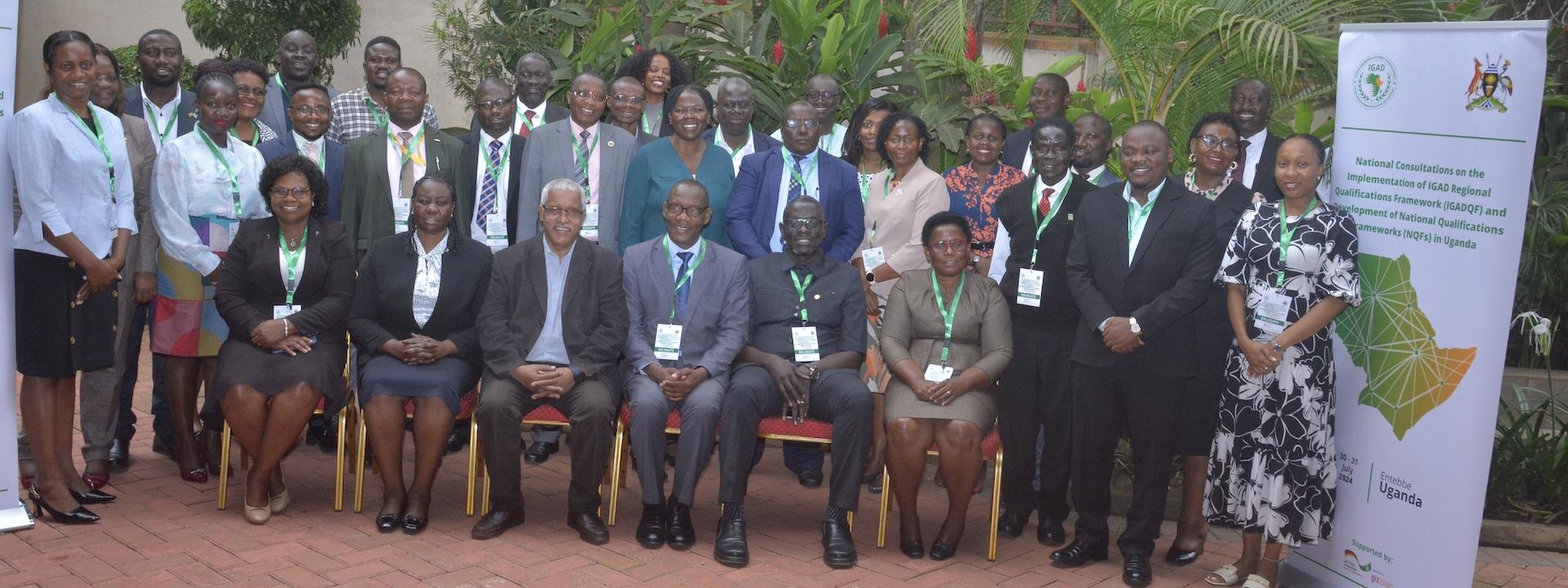July 30, 2024 (Entebbe City, Uganda): The Ministry of Education and Sports, Government of Uganda, with the support from IGAD Secretariat, are conducting national consultation with stakeholders on advancement and enhancement of the Ugandan National Qualifications Framework for access to quality education for the displaced population migrants and host communities.
The two-days national consultation workshop is taking place in Entebbe City and has gathered experts in the education sector, education and training institutions, officials from the Ministries of responsible for Foreign and Internal Affairs, Refugee Affairs, Labour, Social Protection, Planning, Finance, Local Government administrations and Refugee representatives to deliberate on the development and implementation of Uganda’s National Qualifications Framework.
The development of the National Qualifications’ Framework comes on the heels of the May 30th adoption of the IGAD Qualifications Framework by Ministers in Charge of Education from the IGAD region at the 4th IGAD Ministers of Education conference of May 2024 held in Entebbe.
The IGAD Qualifications Framework emphasizes the commitment of IGAD Member States to enhance access to quality education for refugees, returnees, Internally Displaced Persons (IDPS), host communities, among other displaced populations.
Qualifications Frameworks are a key tenet of the Djibouti Declaration and its accompanying Addis Ababa Plan for Action, commitments by IGAD Member States to promote the inclusion of refugees and returnees into national education systems, grounded in principles of equity and addressing structural barriers experienced by displaced persons in the IGAD region.
Dr. Victoria Anib, the IGAD Head of Social Development, representing the Director Health and Social Development, Mme. Fathia Alwan congratulated Uganda for its pivotal role in advancing the IGAD Qualifications Framework and educational quality and fostering national development, regional integration and improve livelihoods of migrants and those for those affected by displacement.
She underscored that IGAD Qualifications Frameworks represent a collective endeavour to foster mutual trust in qualifications and quality of training throughout the region.
“Our work is grounded in the IGAD Regional Education Policy Framework, itself emanating from the Djibouti Declaration and the Addis Ababa Call for Action—milestones in our commitment to uplifting marginalised communities and enhancing educational standards. These declarations have paved the way for the development of Regional Education Quality Standards and the IGADQF addressing credential recognition challenges and facilitating educational and professional mobility thus an affirmation that you can move from one IGAD Member State to another and be able to continue with your education or use your qualifications to find employment that corresponds to your skills.”
“This consultation presents a valuable opportunity to unlock the full potential of the frameworks and enhance educational quality and access throughout our region by harnessing our collective expertise and enthusiasm to discuss and explore strategies for advancing both the IGADQF and the UNQF.”
“It will allow us to refine national and regional coordination mechanisms and governance structures.Qualifications frameworks must be adaptable and supportive of lifelong learning, responding effectively to the evolving needs of education and the workforce. Let us use this opportunity to develop actionable and responsive strategies”.
Dr. Anib said that IGAD will support Member States to expedite the process of developing national qualification frameworks establishing that through national stewardship, the consultations will pave the way for the continued advancement of education and employment opportunities for vulnerable populations within the IGAD region.
The consultations will include discussions on inclusion, recognition and accreditation, the progress of Uganda’s journey in developing the national qualifications frameworks and the proposed governance structure. Student representatives, experts from the IGAD Education Programme and relevant partners are attending the meeting.
The meeting was officiated by Mr. Joseph Kikomeko, Commissioner Teacher Education Training and Development at Uganda’s Ministry of Education and Sports emphasized that the national qualifications framework is in zero draft and these consultations will expedite the development of the framework and how Uganda has well embraced it.
“Our education system is non discriminative and inclusive thus having Refugees, IDPs, PWDs and Returnees all being catered for in our education system. As a country, we are grateful to the task force, IGAD Secretariat and Partners for the efforts being made which will be vital to the development of our NQF” Mr. Kikomeko added.
The Djibouti Declaration on Quality Education for Refugees, Returnees, and Host communities, adopted on 14th December 2017 along with the subsequent Addis Ababa Call for Action, December 2018, represent non-binding commitments by IGAD Member States to enhance education access and quality for refugees, returnees, and displaced populations.
The Djibouti Declaration is one of initiatives under the IGAD Support Platform on Forced Displacement. Launched at the 2019 Global Refugee Forum, the IGAD Support Platform is a mechanism to advocate and offer a comprehensive regional response to forced displacement in the IGAD Region.
The national consultations are supported under the Strengthening IGAD Migration and Displacement Policy Implementation Project (SIMPI), funded by GIZ on behalf of the German Federal Ministry for Economic Cooperation and Development (BMZ).

